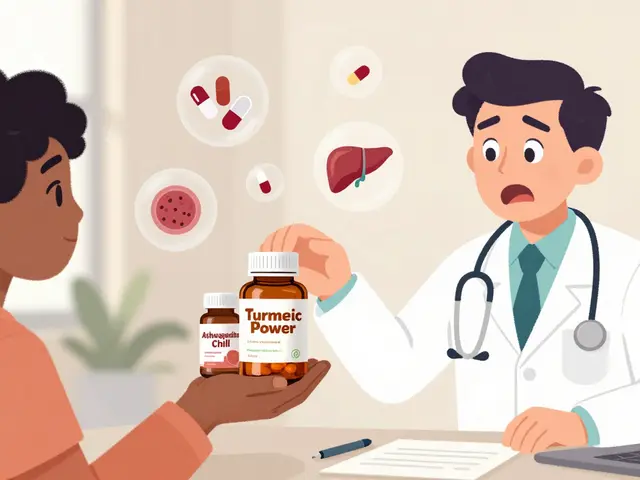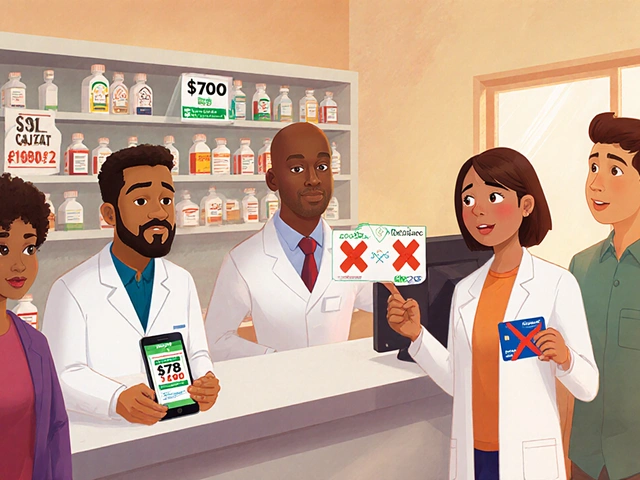Understanding Clobetasol: An Overview
Clobetasol is a potent corticosteroid that is commonly prescribed to treat various skin conditions like eczema, psoriasis, and other inflammatory skin disorders. As a blogger who has personally experienced these skin conditions, I understand the importance of knowing the potential side effects before starting any new medication. In this article, I will be sharing my research on the possible side effects of clobetasol and how you can manage them if they occur. So, let's dive in and explore what you need to know about the potential side effects of clobetasol.
Common Side Effects of Clobetasol
As with any medication, there are common side effects that users may experience when using clobetasol. Some of these common side effects include:
Burning or stinging sensation
One of the most common side effects of clobetasol is a burning or stinging sensation at the application site. This usually occurs immediately after applying the medication and typically subsides within a few minutes. If the burning or stinging sensation persists or worsens, it's important to consult your doctor.
Itching and redness
Another common side effect of clobetasol is itching and redness at the application site. This is usually a temporary reaction, but if it becomes severe or persistent, you should contact your doctor for advice on how to manage this side effect.
Dryness and skin irritation
Clobetasol can sometimes cause skin dryness and irritation. To help minimize this side effect, you can use a gentle moisturizer after applying the medication. Make sure to choose a fragrance-free and hypoallergenic moisturizer to avoid further irritation.
Rare but Serious Side Effects of Clobetasol
While most people using clobetasol may only experience mild and manageable side effects, there are some rare, but serious side effects that need to be discussed as well:
Thinning of the skin
Long-term use of clobetasol can lead to thinning of the skin, making it more prone to bruising, tearing, and infection. It's essential to follow your doctor's instructions carefully and avoid using this medication for extended periods without medical supervision.
Adrenal suppression
In rare cases, the use of clobetasol can lead to adrenal suppression, a condition in which the adrenal glands do not produce enough hormones. Symptoms of adrenal suppression include fatigue, weakness, and low blood pressure. If you suspect that you may be experiencing this side effect, contact your doctor immediately.
Glaucoma and cataracts
Although rare, clobetasol can cause an increase in intraocular pressure if it comes into contact with your eyes. Over time, this can lead to the development of glaucoma or cataracts. To avoid this risk, make sure to wash your hands thoroughly after applying the medication and avoid touching your eyes.
Managing Side Effects of Clobetasol
If you experience any side effects while using clobetasol, there are several strategies that can help you manage them:
Follow your doctor's instructions
It's essential to follow your doctor's instructions regarding the use of clobetasol, including how often to apply it and for how long. Overuse of this medication can increase the risk of side effects.
Keep the treated area clean
Make sure to keep the area where you're applying clobetasol clean and dry. This can help minimize the risk of infection and other complications.
Monitor your symptoms
Regularly assess your skin's condition and any side effects that you may be experiencing. If you notice any changes or worsening of symptoms, consult your doctor.
When to Seek Medical Attention
While most side effects of clobetasol can be managed at home, there are situations where you should seek medical attention. If you experience any of the following, contact your doctor immediately:
- Severe or persistent skin irritation
- Signs of infection (redness, swelling, pus)
- Symptoms of adrenal suppression
- Changes in vision or eye pain
In conclusion, it's essential to be aware of the potential side effects of clobetasol before starting this medication. By understanding these side effects, you can better manage them and know when to seek medical help if necessary. Remember, always consult your doctor if you have any concerns about your health or medications.






17 Comments
We all have a duty to treat our bodies with respect and not just slap on the strongest steroid without thinking about the fallout it can cause. Using clobetasol may feel like a miracle at first but the long term risk of skin thinning and adrenal suppression is a price many ignore. Stay mindful and always ask your doctor how long you should stay on it, because ignorance isn’t bliss when it comes to your health.
From a pharmacokinetic standpoint the percutaneous absorption rate of clobetasol can be significantly modulated by the vehicle formulation and the integrity of the stratum corneum. If you’re concurrently using occlusive dressings you may inadvertently boost systemic exposure, potentially precipitating iatrogenic Cushingoid features. It’s worth reviewing any concomitant topical agents for synergistic irritation risk.
Let me break this down step by step because there’s a lot to consider when you’re dealing with a super‑potent topical corticosteroid like clobetasol. First, the mechanism of action involves binding to glucocorticoid receptors, which then translocate to the nucleus and modulate gene transcription, reducing inflammatory cytokine production. Second, the drug’s high potency means that even short‑term misuse can suppress local immune responses, making the skin more susceptible to opportunistic infections such as Candida or Staph aureus. Third, the risk of skin atrophy isn’t just cosmetic; thinning of the dermis reduces its tensile strength, predisposing you to tears and bruises with minimal trauma. Fourth, while systemic absorption is generally low, areas with a thin epidermis like the face or genital region can absorb enough to affect the hypothalamic‑pituitary‑adrenal axis, leading to adrenal suppression. Fifth, this suppression can manifest as fatigue, hypotension, or even electrolyte imbalances if not caught early. Sixth, you’ll want to monitor intraocular pressure if the medication accidentally contacts the eyes because elevated pressure can silently set the stage for glaucoma. Seventh, using a fragrance‑free, hypoallergenic moisturizer after application can help restore barrier function and mitigate dryness. Eighth, avoid occlusion unless specifically prescribed, because it can dramatically increase percutaneous absorption. Ninth, remember that the recommended duration is typically two weeks or less for most conditions; longer usage should be under strict medical supervision. Tenth, if you notice any signs of infection-redness, swelling, pus-discontinue use and seek care promptly. Eleventh, keep a symptom diary; noting the time of application versus any burning or stinging sensations helps your provider adjust dosing. Twelfth, regularly assess the treated area for signs of thinning; a simple pinch test can reveal loss of elasticity. Thirteenth, educate yourself on the signs of adrenal crisis-severe vomiting, abdominal pain, and profound weakness-and have an emergency plan. Fourteenth, discuss any other medications you’re on because systemic steroids can interact with drugs like anticoagulants or antidiabetic agents. Finally, always have a follow‑up appointment scheduled within a week of starting therapy to review your response and any side effects. By staying vigilant and proactive, you can reap the benefits of clobetasol while minimizing its risks.
While the content is mostly accurate, there are a few grammatical nuances worth noting. For instance, “make sure to wash your hands thoroughly after applying the medication and avoid touching your eyes.” should be split into two independent clauses with a semicolon or a period for clarity. Also, the phrase “the use of clobetasol can lead to adrenal suppression” would read better as “clobetasol use can lead to adrenal suppression.” Tiny tweaks, but they enhance readability.
Hey everyone! Great info here, really helpful! I’ve found that using a fragrance‑free, hypoallergenic moisturizer right after applying clobetasol makes a world of difference, especially for those with sensitive skin. Also, setting a reminder on your phone to track how long you’ve been using it can prevent accidental overuse. Keep sharing these tips, it’s awesome to learn from each other! 👍
Oh sure, because nothing says ‘American ingenuity’ like slapping on a super‑steroid without a second thought.
The side effects feel like a betrayal of my skin.
Listen, they don’t tell you in the pamphlet that the pharma giants are using clobetasol as a gateway drug for bigger, more addictive chemistries. Every time you apply it, they’re collecting data on skin reactions to fine‑tune their next product. It’s a silent experiment on us, and we’re the guinea pigs.
One could argue that the very act of medicating our skin reflects a deeper philosophical tension between accepting our natural imperfection and striving for a curated perfection. The delicate balance between therapeutic benefit and iatrogenic harm is reminiscent of the ancient paradox of the ship of Theseus-when does a treated skin become something other than the self? Yet, we persist, seeking relief, guided by empirical evidence and trust in our physicians.
Let’s be clear: if you’re not following the prescribed schedule, you’re basically inviting trouble. Overuse equals higher risk for adrenal suppression and skin atrophy. Stick to the plan.
Everyone, let’s remember that staying informed is the first step toward empowerment. If you’re experiencing mild irritation, try applying a thin layer of a gentle, fragrance‑free moisturizer after the clobetasol to restore the skin barrier; it often reduces that burning sensation. For those concerned about long‑term effects, schedule regular check‑ins with your dermatologist-they can monitor for signs of skin thinning or adrenal issues and adjust treatment as necessary. And don’t forget, it’s perfectly okay to ask questions about the medication; your healthcare provider is there to help you navigate these decisions safely. Keep supporting each other, share your experiences, and stay proactive about your skin health. Together, we can make sure that the benefits of clobetasol outweigh the risks.
While the article is thorough, one must consider that individual variability can affect outcomes, and thus clinical judgment remains paramount.
Yo, thanks for the solid rundown! Just a heads up-if you’re using clobetasol on cracked skin, the absorption can be crazy high, so maybe keep an eye on that and chat with your doc if things feel off. Stay safe!
Great info, thanks! 😊 Remember to keep a routine and don’t over‑do it. Your skin will thank you! 👍
I get the concern, but let’s keep the conversation respectful. The facts speak for themselves-use as directed, monitor side effects, and stay in touch with your healthcare provider.
In accordance with best clinical practice, patients are advised to adhere strictly to the prescribed regimen for clobetasol, ensuring periodic evaluation to preempt adverse outcomes such as cutaneous atrophy or systemic hormonal disturbances.
Hey folks, just wanted to say you’re all doing great sharing tips. If you’re ever unsure, a quick call to your dermatologist can clear things up and give you peace of mind.